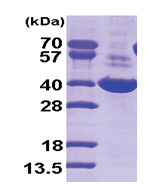AKR1C1 / DHH1 (1-323, His-tag) Human Protein
Other products for "AKR1C1"
Specifications
| Product Data | |
| Species | Human |
| Expression Host | E. coli |
| Expression cDNA Clone or AA Sequence |
MGSSHHHHHH SSGLVPRGSH MDSKYQCVKL NDGHFMPVLG FGTYAPAEVP KSKALEATKL AIEAGFRHID SAHLYNNEEQ VGLAIRSKIA DGSVKREDIF YTSKLWCNSH RPELVRPALE RSLKNLQLDY VDLYLIHFPV SVKPGEEVIP KDENGKILFD TVDLCATWEA VEKCKDAGLA KSIGVSNFNR RQLEMILNKP GLKYKPVCNQ VECHPYFNQR KLLDFCKSKD IVLVAYSALG SHREEPWVDP NSPVLLEDPV LCALAKKHKR TPALIALRYQ LQRGVVVLAK SYNEQRIRQN VQVFEFQLTS EEMKAIDGLN RNVRYLTLDI FAGPPNYPFS DEY
|
| Tag | His-tag |
| Predicted MW | 38.9 kDa |
| Concentration | lot specific |
| Purity | >90% by SDS - PAGE |
| Buffer | Presentation State: Purified State: Liquid purified protein Buffer System: 20 mM Tris-HCl buffer (pH 8.0) containing 1 mM DTT, 20% glycerol |
| Bioactivity | Biological: Specific activity is approximately 0.15 - 0.2 units/mg protein. Enzymatic activity was confirmed by measuring the amount of enzyme catalyzing the oxidation of 1 micromole NADPH per minute at 25°C. Activity Assay 1. Prepare a 1.0 ml reaction mix into a suitable container : The final concentrations are 0.1M sodium phosphate (pH 7.0), 10mM DL-glyceraldehyde, 0.3mM NADPH. 2. Add 50 ul of recombinant AKR1C1 solution with various concentrations (2.5ug, 5ug, 10ug) in 750 ul reaction buffer. 3. Mix by inversion and incubate at 25°C for 2.5 minutes. 4. Add 200 ul of 50 mM DL-glyceraldehyde as a substrate and immediately mix by inversion. 5. Record the increase in A340nm for 3 minutes. |
| Preparation | Liquid purified protein |
| Protein Description | Recombinant AKR1C1 protein, fusd to His-tag, was expressed in E.coli and purified by using conventional chromatography techniques. |
| Storage | Store undiluted at 2-8°C for up to two weeks or (in aliquots) at -20°C or -70°C for longer. Avoid repeated freezing and thawing. |
| Stability | Shelf life: one year from despatch. |
| Reference Data | |
| RefSeq | NP_001344 |
| Locus ID | 1645 |
| UniProt ID | Q04828 |
| Cytogenetics | 10p15.1 |
| Synonyms | 2-ALPHA-HSD; 20-ALPHA-HSD; C9; DD1; DD1/DD2; DDH; DDH1; H-37; HAKRC; HBAB; MBAB |
| Summary | 'This gene encodes a member of the aldo/keto reductase superfamily, which consists of more than 40 known enzymes and proteins. These enzymes catalyze the conversion of aldehydes and ketones to their corresponding alcohols by utilizing NADH and/or NADPH as cofactors. The enzymes display overlapping but distinct substrate specificity. This enzyme catalyzes the reaction of progesterone to the inactive form 20-alpha-hydroxy-progesterone. This gene shares high sequence identity with three other gene members and is clustered with those three genes at chromosome 10p15-p14. [provided by RefSeq, Jul 2008]' |
| Protein Families | Druggable Genome |
| Protein Pathways | Metabolism of xenobiotics by cytochrome P450 |
Documents
| FAQs |
Resources
Recombinant Protein Resources |
{0} Product Review(s)
0 Product Review(s)
Submit review
Be the first one to submit a review
Product Citations
*Delivery time may vary from web posted schedule. Occasional delays may occur due to unforeseen
complexities in the preparation of your product. International customers may expect an additional 1-2 weeks
in shipping.






























































































































































































































































 Germany
Germany
 Japan
Japan
 United Kingdom
United Kingdom
 China
China
